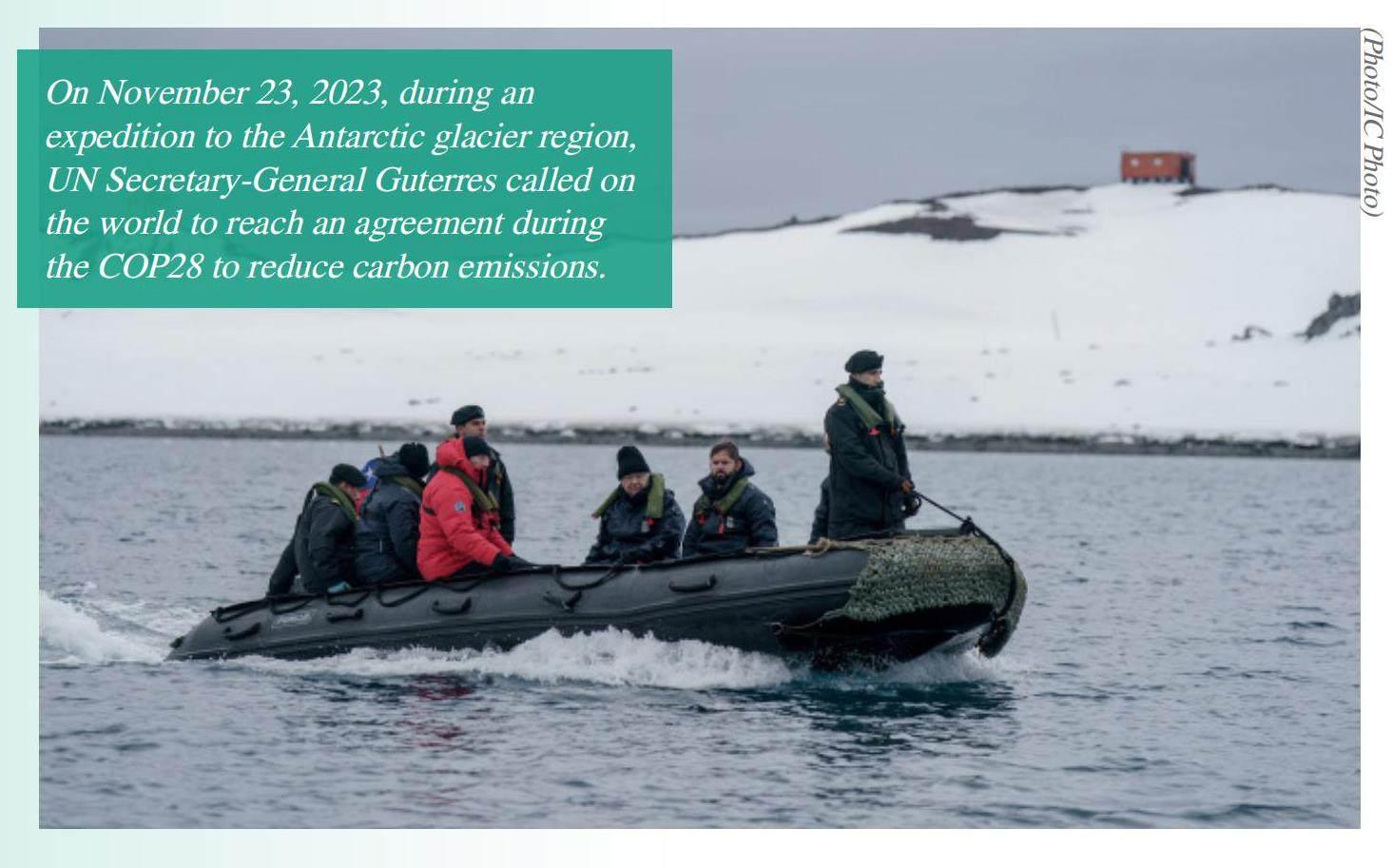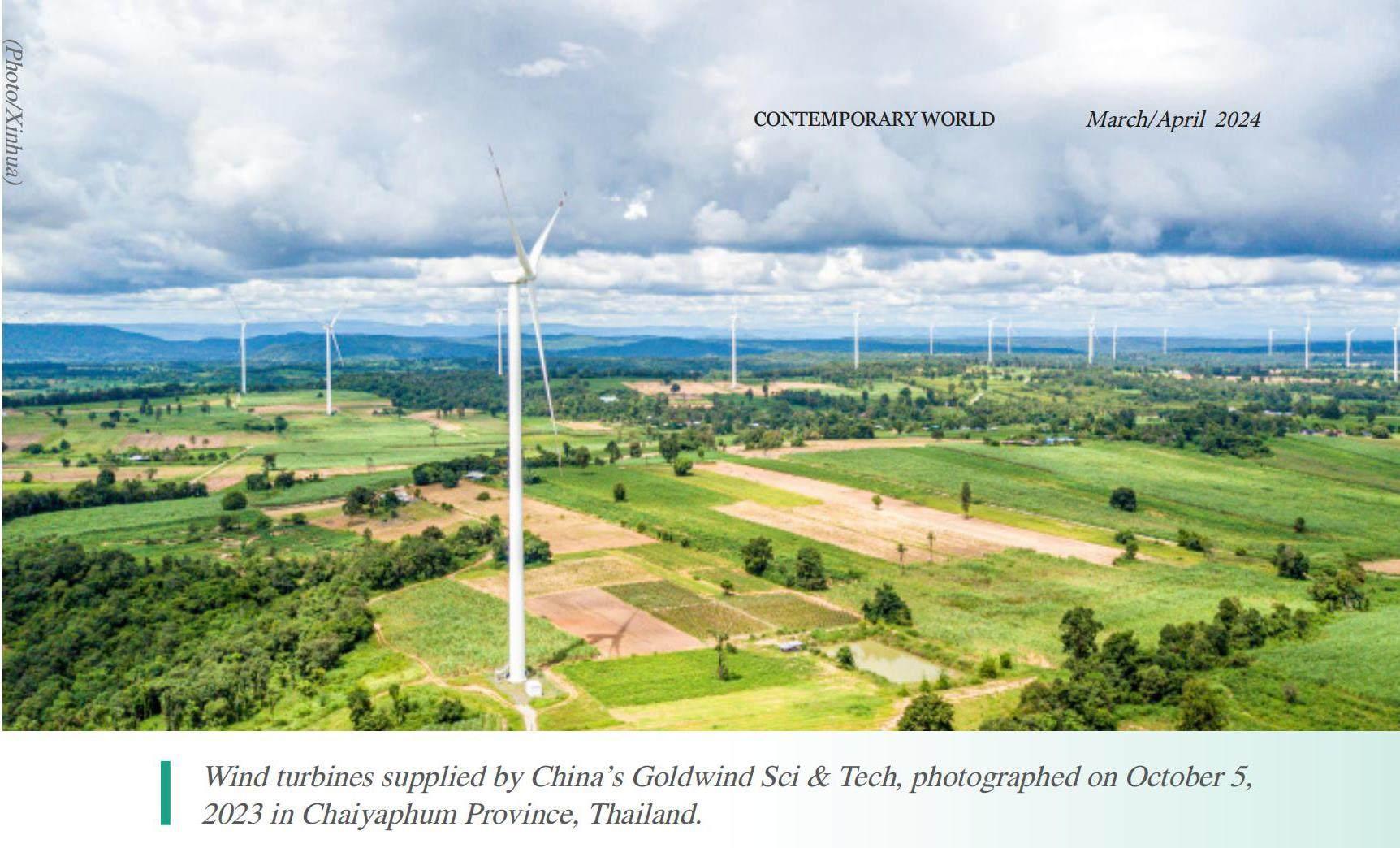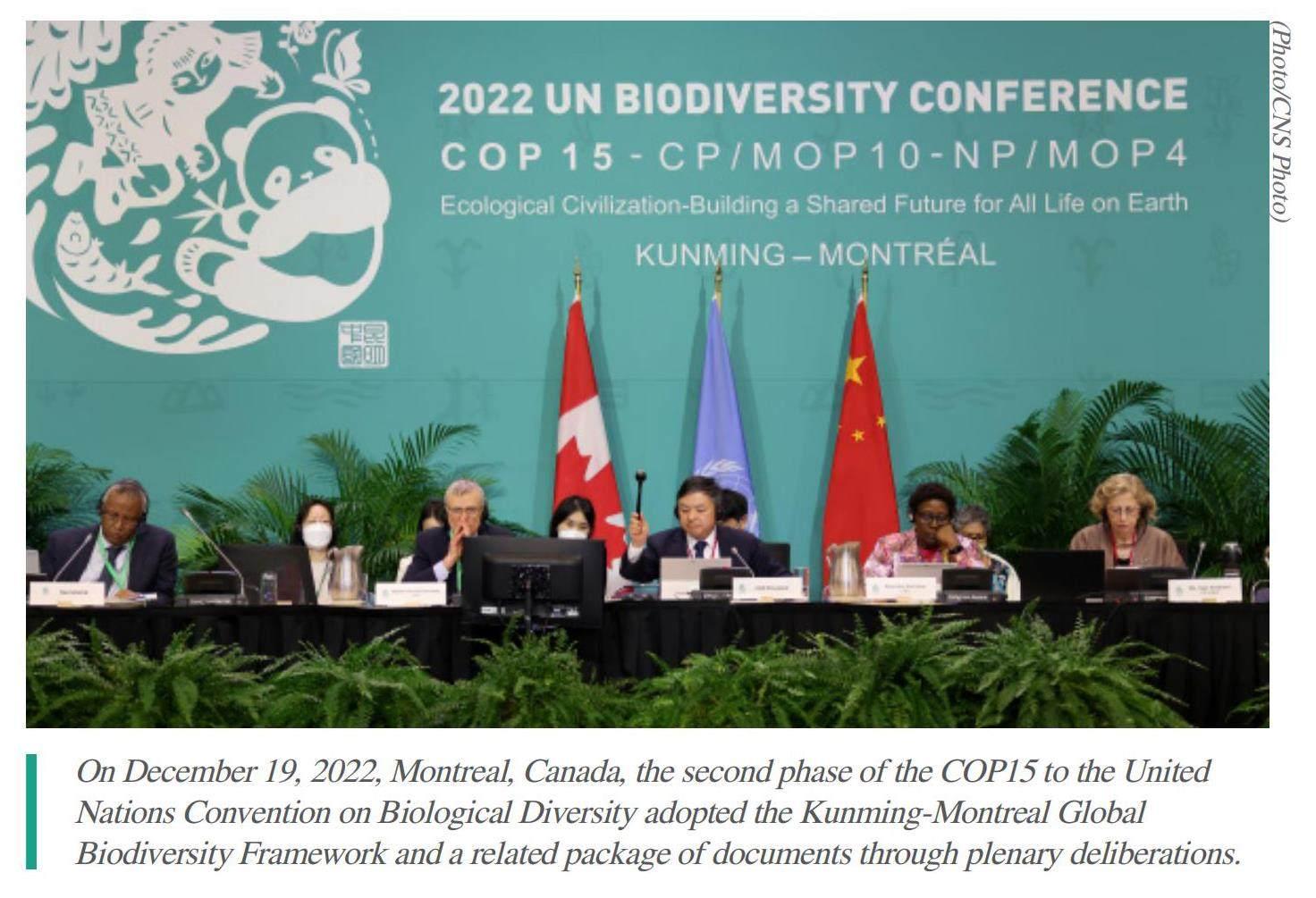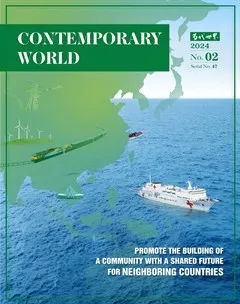Global Climate Governance and China’s Contributions in Perspective of a Community with a Shared Future for Mankind
Li Shuyun



In recent years, global climate changes have been rapid, unprecedented and intensifying. Increasingly worsened conditions of existence are forcing vulnerable populations toward destruction. According to the Contribution of Working Group I to the Sixth Assessment Report (AR6) of the Intergovernmental Panel on Climate Change (IPCC), observed increases in well-mixed greenhouse gas concentrations since around 1750 are unequivocally caused by human activities, and if global warming continues to follow current trends, the global climate will move towards an irreversible tipping point of systemic collapse. Just as the impact of climate change on human society is irreversible, the process of global climate governance will not allow reversal as well. In face of severe challenges of global climate change, no country is immune. Guided by the vision of a community with a shared future for mankind, China has made unique contributions to meeting challenges by taking concrete actions of reducing carbon, mitigating pollution and expanding green development.
New Challenges Facing Global Climate Governance
As a branch of global governance, global climate governance faces many challenges: on the one hand, the issues such as imperfect climate governance system and the lack of leadership; on the other hand, the reluctance of developed countries to take historical responsibility, resulting in global climate governance being short of sufficient public goods; both insufficient binding force of plural governance framework centered on the United Nations Framework Convention on Climate Change, and the fragmentation of governance rules and institutions; both the dilemma of collective action and the tragedy of the commons caused by free riding. In 2023, geopolitical conflicts intensified, with food, energy and debt crises overlapping, and various challenges piling up. As existing problems were yet to be solved, new problems emerged one after another.
I. Interdependence Between Mankind and Ecosystems Deepens, Making Global Climate Governance More Difficult
As Earth being a natural whole, the climate change of one region will inevitably lead to that of another region correspondingly. Deepening interdependence between mankind and ecosystems intensifies vulnerability of ecosystems, and global climate change increasingly affects human life safety. According to statistics, from 2010 to 2019, weather-related events displaced about 23 million people each year. According to the Synthesis Report of AR6, about 3.3 to 3.6 billion people worldwide were in a highly vulnerable environment for climate change. As global warming continued to occur and adaptive effectiveness declined, limited adaptation and poor adaptation were to cause additional damage to vulnerable populations.
The benefit spillover effect of global climate governance increases uncertainty of climate governance. When governance benefits cannot be fully internalized into domestic interests resulting in benefits spilling over, making it necessary to increase the burden of governance costs for countries concerned, willingness of some countries to use climate resources is on the rise and that for climate governance, on the decline, which aggravates the vulnerability of ecosystems and the threat to mankind, leading to soaring difficulty of global climate governance.
II. Geopolitical Competition of Major Countries Becoming Unprecedentedly Fierce, Adding to Uncertainties of Global Climate Governance
According to the Annual Report of International Politics and Security (2023) released by the Institute of World Economics and Politics, Chinese Academy of Social Sciences, the year 2022 witnessed the most violent turbulence and changes in the international political pattern and situation since the end of the Cold War. The fierce competition of the major countries and geopolitical conflict had a significant impact on the pattern of international relations. Lasting COVID-19 pandemic and frequent occurrence of extreme weather pushed up global crises such as energy, food and debt crises, which made global governance difficult. The intensified geopolitical competition between the major countries had an important impact on global governance, resulting in global climate governance facing greater challenges and uncertainties.
The ongoing Ukraine crisis since 2022 has marked an infection point in energy security, food security and sustainable development, and intensified geopolitical conflicts, whereas the Western energy sanctions against Russia have brought many European countries into energy crisis, which has also had a huge impact on global energy market. With 2022 Nord Stream pipeline sabotage, Germany, France, Austria, The Netherlands, Italy and Britain were forced to restart coal power, directly increasing Europes carbon emissions.
The response to climate change was once hopeful to be an important support for building a new model of major-country relationship between China and the US, but the US crackdown on China dashed that hope. As Western countries had an absolute advantage in technology to tackle climate change, according to the provisions of the Paris Agreement, developed countries had the responsibility and obligation to provide technical support to developing countries. Against the background of intensified geopolitical competition, the unreasonable sanctions imposed by the US on China would undoubtedly affect the in-depth cooperation between China and the US in global climate governance and bring greater uncertainty to global climate governance.
III. Political Manipulation of Developed Countries Hinders the Process of Global Climate Governance
Climate change is a global scientific issue, whereas climate governance is an international political issue. The root cause of difficulties for global climate governance lies in the political manipulation of developed countries detaching legitimacy, rationality and feasibility of climate policy, making it impossible for global climate governance to realize smoothly.
Developed countries have played politics in all aspects of climate governance, and their attitude to implementing the principle of “common but differentiated responsibilities” has regressed from being forced to accept but refusing to implement it to gradual dilution and deviation from focus, that is, from weakening the principle of differentiation to lopsidedly emphasizing common responsibility, requiring emerging markets and developing countries to undertake more emission reduction obligations. Leveraging their scientific advantages, developed countries also manipulate IPCC assessments to align with their own goals. The Synthesis Report of AR6 released in 2023 was biased by influence of developed countries and downplayed the historical responsibility of developed countries.
Climate change is a typical global common issue, and its essential attributes of indivisibility, permeability, seriousness and urgency determine that the response to climate change must be achieved through most extensive global cooperation. Developed countries carry forward the habitual thinking of zero-sum game to global climate governance and play politics there, which not only harms the basic rights of developing countries, but also reduces their willingness to participate in global climate governance, thus hinders the process of global climate governance.
Chinas New Measures to Participate in Global Climate Governance
The key to tackling climate change lies in action. China is a respondent and doer in tackling climate change, always adhering to advancing global climate governance with practical actions under the framework of the United Nations (UN), always adhering to multilateral rules of procedure featuring party-driven and consensus-based, firmly upholding the targets, principles and framework determined by the UN Framework Convention on Climate Change and the Paris Agreement, and taking multiple measures to ensure that the Paris Agreement progresses steady and goes far.
I. To Improve Global Climate Governance with Chinese Philosophy and Practices
China has vigorously advocated building a fair and rational global climate governance system for win-win results, constructively participated in international climate negotiations, and given full play to the leading role of its leaders climate diplomacy, demonstrating Chinas will and attitude.
Chinese President Xi Jinping has elaborated Chinas concept and plans for global climate governance at the UN General Assembly and other international multilateral occasions. At the general debates of the UN General Assembly of 2020 and 2021, Xi made solemn commitments to scaling up Chinas Nationally Determined Contributions (NDC), stepping up support for other developing countries in developing green and low-carbon energy, and building no new coal-fired power projects abroad. In September and October 2021, China successively issued the Working Guidance for Carbon Dioxide Peaking and Carbon Neutrality in Full and Faithful Implementation of the New Development Philosophy and the Action Plan for Carbon Dioxide Peaking Before 2030. In November 2021, Xi made a statement at the COP26 in which he emphasized that “Guided by the vision of a community of life for man and Nature, China will continue to prioritize ecological conservation and pursue a green and low-carbon path to development.” In the same year, at the UN Convention on Biological Diversity COP15, Xi stressed, "We need to respect Nature, follow Natures laws and protect Nature, so as to build a homeland of harmonious coexistence between man and Nature." The Kunming-Montreal Global Biodiversity Framework set out strategic targets for global biodiversity conservation in the next decade. China took the lead in investing RMB 1.5 billion to establish the Kunming Biodiversity Fund to support biodiversity conservation in developing countries.
II. To Lead Formulation of Climate Change Policies with Carbon Peaking and Carbon Neutrality Goals
In 2020, China announced to renew and strengthen its NDC targets and measures, aiming to peak carbon dioxide emissions before 2030 and achieve carbon neutrality before 2060. To achieve carbon peaking and carbon neutrality goals, China came up with a series of new policies and measures to implement its NDC and to address climate change with action, which was led by institutional building. In May 2022, China issued the National Strategy for Climate Change Adaptation 2035, making overall plans for current climate change adaptation work to 2035. In June 2022, China issued the Plan for Synergizing Pollution Reduction and Carbon Mitigation, taking synergy of pollution reduction and carbon mitigation as an important path to achieving carbon peaking and carbon neutrality goals and an important part of “1 + N” policy system for carbon peaking and carbon neutrality, and taking green and low carbon development for an important content of the 14th Five-Year Plan, which may provide an economic development model of reference for global climate governance. China released Chinas National Assessment Report on Climate Change (2023), the Technical Guidelines for Adapting to Climate Change-Frailty, Impact and Risk Assessment, the Outline for High Quality Development of Meteorology (2022-2035), the Blue Book on Climate Change of China (2023) and the Green Book of Climate Change: Annual Report on Actions to Address Climate Change (2022).
III. To Promote Green Transition of BRI Partner Countries with a Green Silk Road
The original purpose of the Belt and Road Initiative (BRI) is to uphold the principle of extensive consultation, joint contribution and shared benefits, develop economic partnerships with BRI partner countries in jointly building a Land and Sea Silk Road Economic Belt, and building a community with shared interests, shared future and shared responsibilities. Over the past 10 years and more since its inception, the BRI has attracted the participation of more than 150 countries and more than 30 international organizations.
China has attached great importance to building the Belt and Road with a green base color, and put forward the proposition of “strengthening cooperation on ecological environment, biodiversity and climate change, and jointly building a green Silk Road”. The green Belt and Road perfectly fits Chinas strategic positioning of responding to climate change, promoting sustainable development, and providing cleaner and more environmentally friendly growth opportunities for the people of BRI partner countries. In 2022, as Chinas National Development and Reform Commission and three relevant departments jointly issued the Opinions on Promoting the Green Development of Belt and Road, a basic pattern of BRI joint green development took shape.
In recent years, with the support of multilateral cooperation mechanisms like the BRI International Green Development Coalition and the Belt and Road Environmental Big Data Platform, China has promoted the Green Silk Road Envoys Program and the Belt and Road South-South Cooperation Initiative on Climate Change, and removed from its foreign aid list coal-fired power projects in construction projects, replaced it by solar energy, wind energy, photovoltaic and other new energy projects, in an effort to boost green transition of its BRI partners.
Chinas New Contributions to Leading Global Climate Governance
As “global governance is conceived to include systems of rule at all levels of human activity, from the family to the international”, the focus of global governance is to establish international rules and institutions. President Xi proposed jointly building a community with a shared future for man and nature, serving not only as an ideological guidance to global climate governance, but also as Chinese wisdom and contributions to tackle climate change.
I. Reshaping Values on Relationship Between Man and Nature Provides Conceptual Guidance for Global Climate Governance
The relationship between man and nature is a problem that human society has all along reflected upon. Before the Industrial Revolution, man and nature co-exited in harmony. With industrialization, individualistic values of capitalist society lord it over collectivist values, and unlimited inflation of selfish desires causes nature to suffer “the tragedy of the commons”, leading to opposition between man and nature.
The concept of a community with a shared future for man and nature embodies the views of inclusive culture and civilization, standing for the sublimation of a Chinese world view or “all under heaven” view. The interpretations of “all under heaven” view since the ancient times may provide a new perspective of global climate governance. Laozi called for “observing all under heaven through all under heaven”, and Liang Shuming, a thinker of New-Confucianism, believed that “all external beings are a problem to be resolved rather than a object to be conquered”. The concept of a community with a shared future for mankind proposed by President Xi is a global value in meeting common challenges of mankind, that is in intrinsic linkage with global governance. As British scholar Barry Buzan observed that when climate change threatens “all under heaven” in a very deep and comprehensive way, it is difficult to describe and analyze it with Western concept of international relations. However, the urgency to tackle climate change is very much in line with contemporary and traditional Chinese values, and this urgency also injects rich content into the concept of a community with a shared future for mankind advocated by China. To use the concept of a community with a shared future for mankind as an analytical framework to conceive climate change, and resolve the dilemma of global climate governance, is the global climate governance plan provided by China, and should also be chosen by mankind. The concept of a community with a shared future for mankind has been written into several resolutions adopted by the UN Security Council and the UN Human Rights Council, giving proof to the fact that it meets the common expectations of the international community demonstrating Chinas contributions to the process of global climate governance.
II. Chinas Effective Practice to Adapt to Climate Change Sets an Example for Global Climate Governance
In recent years, Chinas climate action from strategic design to concrete practice has been well thought out and implemented. Guided by Xi Jinping Thought on Ecological Civilization, China has in the new era adhered to sustainable development and stuck to the guideline of prioritizing conservation, protection and natural restoration. It has put to practice the concept that lucid waters and lush mountains are invaluable assets and launched a series of projects for the integrated conservation and restoration of mountains, rivers, forests, farmland, lakes, grasslands, deserts, glaciers and snow mountains in order to tackle climate change and achieve harmonious coexistence between man and nature. To steadily proceed with carbon peaking and carbon neutrality, China has implemented the “1 + N” policy system for carbon peaking and carbon neutrality, promoting the switchover from “double control” of energy consumption to “double control” of both the amount and intensity of carbon emissions. The country has taken practical measures to build a national carbon emissions trading market, improve laws, regulations and policy system, establish and improve a long-term data quality management mechanism, all with good results. According to statistics, Chinas carbon intensity decreased by 50.8% in 2021 and by more than 51% in 2022, both compared to 2005. The share of non-fossil energy in energy consumption reached 16.6% in 2021 and 17.5% in 2022. Barry Buzan believed that few countries can “pool resources to accomplish major tasks” as China does.
China is a major driver of renewable energy development. In 2023, newly installed power capacity was about 330 million kW, and total installed capacity reached 2.9 billion kW, up 12.9% year on year. As renewable energy became a new force to guarantee power supply, total installed capacity reached 1.45 billion kW, accounting for more than 50% of the total installed power generation capacity with a historic overtake of coal-fired power generating capacity, and total installed generation capacity of wind and solar power generation exceeded 15% of total social power consumption, achieving the goal of “installed capacity of wind and photovoltaic power increasing about 160 million kW in the whole year”.
III. Active participation in international climate cooperation demonstrates firm commitment of China as a major country
“Fighting against climate change is not only the convergence point of interests of all countries and the best entry for their cooperation, but also the main direction of major country cooperation.” In the face of increasingly severe climate crisis, China has adhered to the principles of treaty-party-driven, consensus based and win-win cooperation, given full play to the multi-channel synergy, and promoted global climate governance through multilateral mechanisms.
At the bilateral level, by the end of June 2023, China had signed 46 South-South cooperation documents on climate change with 39 developing countries, including construction of three low-carbon pilot zones and more than 70 climate change mitigation and adaptation projects. Since 2022, China has undertaken 54 climate aid projects in areas such as climate disasters and land use improvement, strengthened bilateral China-EU and China-US cooperation and exchanges, and established bilateral energy dialogue mechanisms with several EU member states to continuously expand cooperation with the EU and its member states in energy field.
At the multilateral level, China continues to promote international cooperation on climate change. First, fully and deeply participating in international negotiations through major channels such as the UN Framework Convention on Climate Change and the Paris Agreement. Second, elaborating political stance and building political consensus on climate change through holding and taking part in multilateral international conferences. And building political consensus by holding multilateral ministerial conferences on climate action and high-level conferences on climate change.
At the regional level, China has promoted the construction of a community with a shared future with the Shanghai Cooperation Organization, the Association of Southeast Asian Nations, the League of Arab States, the African Union, the Pacific Island countries, and Latin America. China contributed RMB 20 billion to the establishment of the China South-South Cooperation Fund on Climate Change to help developing countries tackle climate change, and created the Global Development and South-South Cooperation Fund totaling US $4 billion to develop 10 low carbon pilot zones, 100 mitigation and adaptation projects and 1,000 climate change training programs to train about 2,300 officials and technicians in the field of climate change in more than 120 developing countries.
—————————
Li Shuyun is Vice President of Liaoning University
- 当代世界英文版的其它文章
- World Trade Organization Reform and the Role of the Global South
- The Resilience and Flexibility of Asia-Pacific Regional Economic Cooperation in the Period of Worldwide Turbulent Changes
- Asia-Pacific Security Situation and Strategic Response Under Great Changes
- New Developments in the Security Situation in China’s Neighborhood and the Building of a Community with a Shared Future for Neighbors
- Relations with Neighboring Countries, Neighboring Region and China’s Neighborhood Environment
- Forty Five Years of Working Hand in Hand: A Review and Outlook on Friendship Between China and Djibouti

